#historical fiction
Text
King Baldwin IV x reader - I’ll be waiting for you
A/N: Well, how could I not make another fic for King Baldwin when the other one I made is my most liked post yet, so I decided to write this little pieceee. Sooo I guess I should warn y'all that this one will be a little less historically accurate (not that the first one was that great of a historical piece but you get the idea). Oh and as usual, this fic came into my mind the moment I saw the painting just below (which is "the Reconciliation of the Montagues and Capulets Over the Dead Bodies of Romeo andJuliet" by sir Frederic Leighton)Now enough chatting, more King Baldwin brainrot.
Summary: in a desperate attempt to protect his kingdom after having punished Reynald de Chatillon, the king is exhausted and the long ride has increasingly worsened his already wary condition. Once he’s escorted back to the palace, his loving wife wastes no time to reunite with her beloved husband.
Warnings: kinda angsty (no happy ending tbh), vague descriptions of Baldwin’s illness related wounds. Also, reader specifically described as female.
Word count: 3209
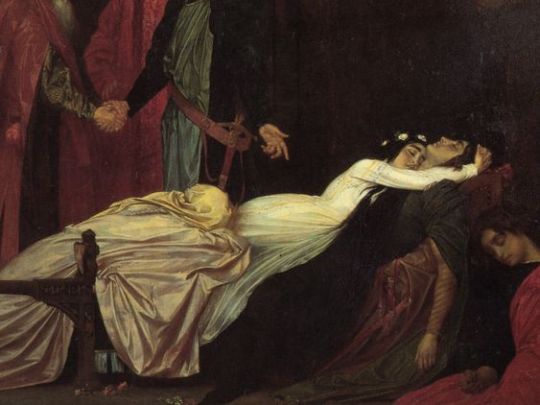
You sat on your throne, high and proud like the royalty you were. But under the facade of your noble confidence, you felt small. Smaller than ever, actually, as the yelling of all the men in front of you filled the air and rose up to the open sky. With a simple, reckless act, Reynald de Chatillon and Guy de Lusignan had just screwed years of efforts that King Baldwin had spent trying to maintain that delicate peace that required so many lives and time to build. All washed away from the raging river that were Reynald and Guy.
While the two men tried to defend their senseless attack, backed by a substantial group of men, another opposing group shouted at them, berating them for the offense they had given not only to Saladin but also to Jerusalem itself.
You sigh, fighting the urge to cover your ears, and curl into your own body; you opt to just turn your head and look at your beloved husband. He looked to be in a similar state as you were: although his face was now fully covered -a means of hiding the decaying state of his leprosy-ridden body- his head was bent with weary alertness, like a hawk watching its prey from a distance. You watched his body, languidly seated on his much larger throne, the only sitting position that brought him no discomfort, though it looked almost more like he was about to lie down.
It broke your heart to see how that disease had ravaged Baldwin's body, in recent years more and more. To see him there, on the same throne on which he once sat tall and proud, while now he barely had the strength to stay upright. And you knew he was thinking the very same thing.
You were about to open your mouth, whisper something to him, anything, in order to shake him out of his thoughts and that chaotic situation, but you were interrupted in your actions by an official, who rushed to the king's side, handing him a scroll. His bandaged hands clumsily opened the scroll, and you found salvation from the noise of the room by concentrating on watching Baldwin read carefully. You watched his eyes, blue as the sky and like the waves of the sea that brought you to the Holy Land, now covered with a pale glassy glaze.
You frowned when you heard Baldwin freeze in place, even his sitting became more erect, as if a cube of ice had slid down his back. With his gaze still fixed on the words written in that letter, he merely raised his hand slightly, a clear sign of his will.
"SILENCE!" his guard's shout resounded through the hall, overpowering the furious shouts of the men who had been barking at each other for hours now. They all turned to look at the king; their faces, a few moments ago darkened and wrinkled with anger, were now smooth and relaxed, their eyebrows raised in astonishment at their king's order. Funny, you thought, how these men because of your husband's condition sometimes simply forget how much power he possessed over them. Before it was as if he wasn't even in the room, and they were all playing at being great leaders, now there they were, staring at him, motionless as statues, submissive as ants. You curled your nose discreetly, your face a mixture of disgust and contempt. Pathetic, you thought.
After what seemed like an eternity, Baldwin finally looked up at the crowd in front of him, finally revealing what it was that had shocked him so much. "Saladin has crossed the Jordan with 200000 men," silence fell, and you felt your body going numb. Your ears seemed muffled, you could barely perceive what was happening around you. At that moment you felt so much fear for your kingdom, and concern for Baldwin and what this impending attack would cost him.
And anger, against those two fools who out of sheer vanity had endangered the lives of all the inhabitants of Jerusalem. They had put Jerusalem itself at risk; they had put Baldwin at risk.
I was brought to attention by Baldwin, who was struggling to pull himself up from his throne, walking toward his most trusted man. "We must meet him before he reaches Kerak. I will lead the army," your husband's voice was hushed and soft, so that only the man in front of him could hear. But it did not escape your ears, the implication those words had: Baldwin wants to stop Saladin, and he wants to do it himself. But this could cost him his life.
You couldn't stop yourself; you jumped up from your seat, eyes wide in an expression somewhere between fear and surprise. Baldwin turned to look at you, the woman who always took his breath away at the mere sight of how beautiful she was. You did not fail to have that effect on him again this time, but not because of your beauty: in your eyes he saw your terror, that this was the last time you would see him alive. They hypnotized him, and begged him in a silent prayer not to leave, to give up this plan, have an ambassador sent, anyone else. Hell, let him send Guy himself to intercept the Saracen, let him be beheaded and his murder settle the account that he himself opened. But the storm of emotion in your eyes contrasted with the gentle stream of emotion flowing from your eyes
But the storm of emotions in your eyes contrasted with the gentle stream of emotions flowing from Baldwin's eyes, barely visible because of the cover concealing his tortured face. He too, through them, was silently pleading with you: but he was asking you to trust, to let go and follow his plan, to try to forget for at least a moment all the warnings the Physicians had given him over the years.
Eventually, you relented, turning your gaze away and opting to stare at a random spot in the corner of the room. Baldwin gave a silent sigh and closed his eyes for a moment, a sign of gratitude, although you could not see it. He turned to the men of his court, and with the little strength his body afforded him, he spoke in a loud, determined voice: "Assemble the army and protect the city."
All this reminded you of the last time Baldwin fought Saladin: he had barely completed his seventeenth year, and young and still full of life, he was ready to ride against the invincible Saracen king. But on that day God had been more merciful. He had granted you, if nothing else, one last night to spend with your husband, had given you the gift of a minimum of time to ensure that you bid Baldwin a proper farewell before he met what could well have been his end. Instead this time, you barely had time to briefly remove the thick veil from his face to give him a fleeting kiss and exchange a handful of words. You fought back the tears as you looked at him, opting instead to bring your hand to his cheek, the flesh of his lip having receded and decayed to such an extent that it had receded down to his cheek, eventually turning into a long scar that protruded down to his cheekbone.
"Let me go with you, I will wait for you at the castle of Reynald de Chatillon-" "No. It is too dangerous. If things go wrong with the negotiations, I don't want you or my sisters anywhere near that man." It was not often that Baldwin interrupted you while you were speaking. He respected you too much to not allow you to finish your sentences, so the fact that he did just now spoke of how important this was to him.
"Then promise me you’ll come back to me. Safe and sound." He snorted softly, giving a hint of smile before copping his face with his hardened hands, "You know I can’t promise it." You know that, but that blatant honesty of his, which you always loved so much, was not what you wanted at the time. No, you wanted reassurance, no matter how truthful, no matter how worthless his promises may be at the end of the day, You need that fleeting distraction that mitigates the fear that’s been eating you from the inside since Baldwin put on his armor. May you risked never seeing him again.
"Please just say it." Your voice came out much softer than you meant, almost less than a whisper, perhaps because of the knot in your throat, which threatened to break free carrying a river of tears. For a moment he remained silent, turning suddenly his face towards the voice of a nobleman who called him from the entrance of his room, but did not even dignify him with an answer. After all, his attention was completely turned to his world. To you. Before I answered you, I drew your head to his with my hands, so that I could place his forehead against yours. Finally, he spoke softly, in that loving tone that he reserved only for you: "Then I promise you that I will return to you in no more than three days, and when I return I will be victorious, and I will be riding."
After that, that moment between the two of you, which so much looked like a heartbreaking farewell, lasted just before Baldwin had to go to his horse to guide his men to the enemy.
And it wasn’t long before the harsh reality became clear to you: he had lied to you. Not maliciously, of course, you were the one who begged him to say those words after all. But the fact is that three days became four, that news of the army of Jerusalem had not come any more, that the last thing you heard of your husband was that only the ride had already tried his weakened body.
Another day passed, then another, and at the dawn of the fourth day since his absence you felt your heart sink. Had something happened to him? Had the negotiations failed? What if his illness had suddenly got the better of him? Or worse, Saladin and his men had shot him, stabbed him, or yet again captured and publicly executed,…
Your mind began to spiral into an ocean of possible reasons behind this delay, and you swore that your breathing had finally stopped once and for all when a messenger on horseback arrived at the palace, frantically dismounting from his steed to rush into the throne room and bring you the message: "The negotiations were successful, but the king is in critical condition! He is returning to Jerusalem on a canopy," you dismissed the man with a slight wave of your hand, so weak that you almost looked numbed; Baldwin's advisors began to chatter, but the background murmur of their murmurs did not seem to reach your ears. No, your attention was elsewhere; it was entirely on your husband.
You took your leave of the court, hurrying to your rooms. There, like a hawk waiting impatiently for prey to feed on, you perched on the balcony overlooking the city below you, on the walls from which not many days ago Baldwin had emerged leading the army.
It was there that you began to think again, this time with a clearer mind as you knew that at least Baldwin was alive and on his way home. On his way to you. Still, this whole situation reminded you of when you were only sixteen years old, and you stood on that balcony as you do now, waiting to see Baldwin return on his horse. And on that day, when he was visible to the naked eye, and your eyes met, you saw all the life and strength of one who had just defeated the greatest enemy of his time. At that moment, he seemed almost immortal to you: he looked like a god riding proudly, leading the thousands of men behind him towards their home.
How unfair fate is, to cut short his life so early. His physicians gave him no more than thirty years, but that time seemed to you to be shortened even more when you finally caught sight of his canopy.
There he lay, sprawled and motionless like a dead body, surrounded by the soft cushions and riders on either side of his transport.
Just two years ago such a journey would not have fatigued him in the least; now he was risking his life just by riding a horse.
Your eyes threatened to fill with tears thinking about how much he had loved riding a horse, and now he found himself bedridden, unable in his passions. You wasted no time running through the palace corridors, eager to reach your beloved as soon as possible.
One turn to the right, then another, then down the steps, and finally straight to the palace doors, where the finely decorated canopy led the love of your life.
You rushed to his side, gently taking his mutilated hand in yours while the other stroked his masked face. He breathed faintly, his eyes closed as he tried to regain his strength after his disease had dealt him this last bludgeon. Feeling your gentle touch, Baldwin's eyes fluttered open, his glassy eyes the color of heaven meeting yours.
"You've been reckless, my love. Putting your life at risk just to do the job of a messenger!" you scolded him, but Baldwin only smiled fondly at your words. "I promised you I would've come back. And that I did, alive too." Although his voice was so weak that it sounded more like a huff of air rather than a sentence, its tone was still laced with playfulness.
It made you unable to resist the smile that was threatening to form on your lips; you did not grace him with an answer yet, opting instead to move your hand to remove the silver mask from his face. You could see his surprised and relieved expression, as he was now finally able to breathe more freely and to look at you properly. He breathed in the sight of you, almost as if trying to take in as much of you as he could. "I can't tell if it's the travel or the sight of you that takes my breath away."
You just smiled bitterly and shook your head at his silly declarations, "It must be the ride, it has tired you so much that it's making you speak nonsense." he giggled weakly, much more tiredly this time, almost as if he was about to doze off. But he fought the tiredness nonetheless, opting to just shake his head and admire you with a lovestruck look. "Maybe I am hallucinating, I think I'm seeing heaven above me."
It was supposed to be a compliment that would've made you giggle and blush, like the ones that he showered you with daily. But instead, it made your heart clench at the bare idea of it. The idea that this would be his last moments before the energies spent for this expedition would be too much for him to handle, and God will reclaim his most virtuous man. It made your throat tighten, and your lower lip tremble.
You tried to hide your troubled state, moving your hand quickly to the curve of his neck. There, you placed a soft, butterfly-like kiss on the little places of skin that haven't been mutilated and bloodied by the leprosy. You kissed him one more time, then another, and another again..
In the end, you lost count of how many kisses you had given him, in a desperate attempt to mend your premature grief, to ground yourself in the feeling that Baldwin is there. He is alive. Yet the feeling of his skin against yours, of his chest rising up and down and his arms weakly holding your soft body, it wasn't enough to stop the tears to start flowing down your cheeks.
And that didn't go unnoticed to Baldwin, who mustered all his strength left to hold you just a little tighter. "Have my words upset you?" you sniffled, trying to recollect yourself before lifting your head to look into his eyes. "No, my dear, you could never. I just-" you stopped for a second, trying to swallow down the lump that had formed in your throat, "promise me this is the last time. Please, tell me that you will stop this nonsense. Let your trusted men handle these matters, command your man like a king not a general!" your hands had moved to his arms, a gesture to both ground yourself and to accentuate just how desperate you were in that moment, only wanting him to just listen.
"I beg of you, my love, stay here. Where you can rest. We both know that you don't have much more time left to live, so stop doing everything in your power to shorten it anymore." A sob slipped from your mouth at the last part. It truly astonished you how careless he seemed about his own condition, almost as if he forgot that any move could be the death of him.
He frowned and sighed at your words, squeezing your forearms softly before he spoke softly. This time though his tone was clearer, less weakened by the outcomes of the past days. "I already spoke to the physician about this: I have no choice, my angel. I'll be bound to my bed until a miracle will better my condition, or until death will take me."
You shut your eyes in relief, resting your forehead against his and sighing shakily, trying to recompose yourself. "I can't live in a world without you.."
"God will give us more time. I promise I won't leave you as long as I breathe on this earth. And. when my time will be over and there will be no future for us in this life, I'll be waiting for you in heaven, if I'll be granted the blessing of a place next to you there."
Not too long after, the physicians that Saladin had promised him arrived at the palace, and you were assisted as they tended to Baldwin's many wounds caused by his sickness. More than the sight of the gruesome pieces of open flesh, what appalled you was just how numb his body had become, so much so that he did not even feel their hands and tools working into his skin. It made you wonder wether or not he even felt your kisses from before.
And you make yourself that same question months later, when you place one last kiss into his forehead as he slept soundly before going to bed yourself, only to wake up to a cold body beside you. You wonder if he ever got to feel that last gesture of love before God had finally claimed him.
You only found solace in the thought that Baldwin would be resting in the realms of heaven above your head, contrary to what the Saracens believe.
A/N: Wowww this gets more fun by the day!! King Baldwin will probably always be my favorite character to write for. He’s my muse. As always ill be waiting for your feedbacks!!!
Oh and also, be prepared in the future for more fics waiting to be posted, I’ve got about ten that are just waiting for the right time to come to light, and many more will come in the future since I’m really finding it therapeutic to write.
#writers on tumblr#angst#fluff#my fic#king baldwin x reader#kingdom of heaven#king baldwin iv#reynald de chatillon#guy de lusignan#reader insert#f!reader#historical fiction#fanfic#x yn#x reader
54 notes
·
View notes
Text
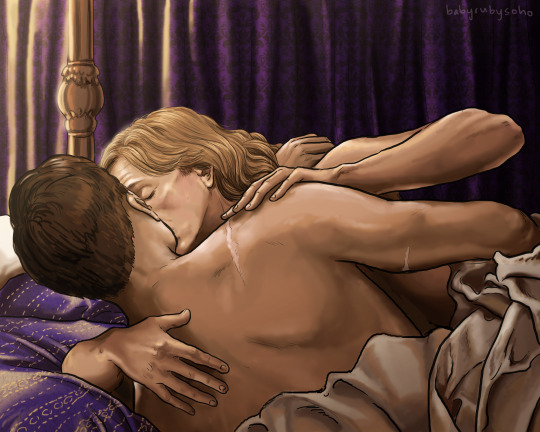
Still very much in the Richard zone, so anything chaste enough to show on tumblr I will ^^
#richard ii of england#david tennant#historical romance#historical fiction#shakespeare fanart#babyrubysoho art
31 notes
·
View notes
Text

Act 3 is well underway, just in time for Hugo's 176th birthday next week... 🥳
In other news, this month's public Backer Bulletin has been delivered!
Read this public update here!
Of Sense and Soul: A Queer Victorian Romance Game 💌
Play the Demo | Get our newsletter | Send us an ask
#visual novel#indie game#kickstarter#historical fiction#queer fiction#historical romance#indie dev#gay#update#backer bulletin
24 notes
·
View notes
Text
One of my biggest nitpicks in fiction concerns the feeding of babies. Mothers dying during/shortly after childbirth or the baby being separated form the mother shortly after birth is pretty common in fiction. It is/was also common enough in real life, which is why I think a lot of writers/readers don't think too hard about this. however. Historically, the only reason the vast majority of babies survived being separated from their mother was because there was at least one other woman around to breastfeed them. Before modern formula, yes, people did use other substitutes, but they were rarely, if ever, nutritionally sufficient.
Newborns can't eat adult food. They can't really survive on animal milk. If your story takes place in a world before/without formula, a baby separated from its mother is going to either be nursed by someone else, or starve.
It doesn't have to be a huge plot point, but idk at least don't explicitly describe the situation as excluding the possibility of a wetnurse. "The father or the great grandmother or the neighbor man or the older sibling took and raised the baby completely alone in a cave for a year." Nope. That baby is dead I'm sorry. "The baby was kidnapped shortly after birth by a wizard and hidden away in a secret tower" um quick question was the wizard lactating? "The mother refused to see or touch her child after birth so the baby was left to the care of the ailing grandfather" the grandfather who made the necessary arrangements with women in the neighborhood, right? right? OR THAT GREAT OFFENDER "A newborn baby was left on the doorstep and they brought it in and took care of it no issues" What Are You Going to Feed That Baby. Hello?
Like. It's not impossible, but arrangements are going to have to be made. There are some logistics.
#idk what to tag this#worldbuilding#writing fiction#historical fiction#fantasy#a real-life example: my dad (a pediatrician) was once entrusted with the care of a baby who was born with a rare condition#this was in a place without great hospital/medical access and anyway they were going to fly the baby over#and he specifically asked them to bring the mother and baby#they show up with baby and...the baby's uncle#and he was like. y'all. do you think I asked for the mom to come just for fun??? We don't have formula here. what is the baby going to eat?
37K notes
·
View notes
Text
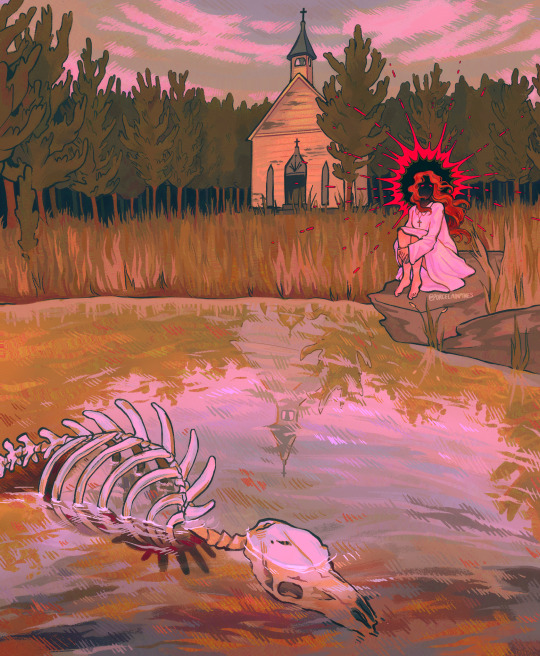
putrid air
#reference photo/inspo is by brendan burton (@burtoo on twt)#original character#digital painting#oc artist#queer artist#digital art#trans artist#lgbt art#oc#oc artwork#cowboy oc#historical oc#western oc#historical fiction#character design#cowboys#rosie#horror art#creepy art#unsettling art
42K notes
·
View notes
Text
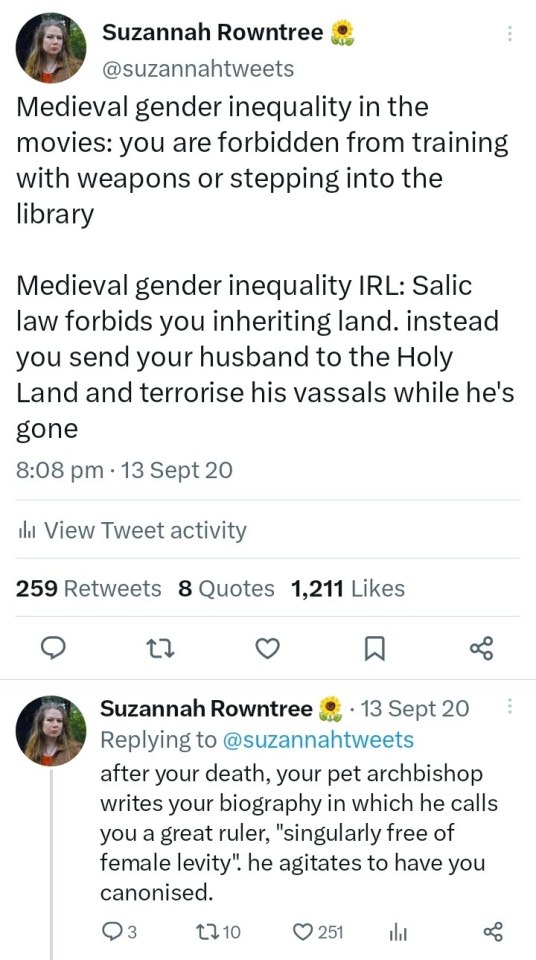
all RIGHT:
Why You're Writing Medieval (and Medieval-Coded) Women Wrong: A RANT
(Or, For the Love of God, People, Stop Pretending Victorian Style Gender Roles Applied to All of History)
This is a problem I see alllll over the place - I'll be reading a medieval-coded book and the women will be told they aren't allowed to fight or learn or work, that they are only supposed to get married, keep house and have babies, &c &c.
If I point this out ppl will be like "yes but there was misogyny back then! women were treated terribly!" and OK. Stop right there.
By & large, what we as a culture think of as misogyny & patriarchy is the expression prevalent in Victorian times - not medieval. (And NO, this is not me blaming Victorians for their theme park version of "medieval history". This is me blaming 21st century people for being ignorant & refusing to do their homework).
Yes, there was misogyny in medieval times, but 1) in many ways it was actually markedly less severe than Victorian misogyny, tyvm - and 2) it was of a quite different type. (Disclaimer: I am speaking specifically of Frankish, Western European medieval women rather than those in other parts of the world. This applies to a lesser extent in Byzantium and I am still learning about women in the medieval Islamic world.)
So, here are the 2 vital things to remember about women when writing medieval or medieval-coded societies
FIRST. Where in Victorian times the primary axes of prejudice were gender and race - so that a male labourer had more rights than a female of the higher classes, and a middle class white man would be treated with more respect than an African or Indian dignitary - In medieval times, the primary axis of prejudice was, overwhelmingly, class. Thus, Frankish crusader knights arguably felt more solidarity with their Muslim opponents of knightly status, than they did their own peasants. Faith and age were also medieval axes of prejudice - children and young people were exploited ruthlessly, sent into war or marriage at 15 (boys) or 12 (girls). Gender was less important.
What this meant was that a medieval woman could expect - indeed demand - to be treated more or less the same way the men of her class were. Where no ancient legal obstacle existed, such as Salic law, a king's daughter could and did expect to rule, even after marriage.
Women of the knightly class could & did arm & fight - something that required a MASSIVE outlay of money, which was obviously at their discretion & disposal. See: Sichelgaita, Isabel de Conches, the unnamed women fighting in armour as knights during the Third Crusade, as recorded by Muslim chroniclers.
Tolkien's Eowyn is a great example of this medieval attitude to class trumping race: complaining that she's being told not to fight, she stresses her class: "I am of the house of Eorl & not a serving woman". She claims her rights, not as a woman, but as a member of the warrior class and the ruling family. Similarly in Renaissance Venice a doge protested the practice which saw 80% of noble women locked into convents for life: if these had been men they would have been "born to command & govern the world". Their class ought to have exempted them from discrimination on the basis of sex.
So, tip #1 for writing medieval women: remember that their class always outweighed their gender. They might be subordinate to the men within their own class, but not to those below.
SECOND. Whereas Victorians saw women's highest calling as marriage & children - the "angel in the house" ennobling & improving their men on a spiritual but rarely practical level - Medievals by contrast prized virginity/celibacy above marriage, seeing it as a way for women to transcend their sex. Often as nuns, saints, mystics; sometimes as warriors, queens, & ladies; always as businesswomen & merchants, women could & did forge their own paths in life
When Elizabeth I claimed to have "the heart & stomach of a king" & adopted the persona of the virgin queen, this was the norm she appealed to. Women could do things; they just had to prove they were Not Like Other Girls. By Elizabeth's time things were already changing: it was the Reformation that switched the ideal to marriage, & the Enlightenment that divorced femininity from reason, aggression & public life.
For more on this topic, read Katherine Hager's article "Endowed With Manly Courage: Medieval Perceptions of Women in Combat" on women who transcended gender to occupy a liminal space as warrior/virgin/saint.
So, tip #2: remember that for medieval women, wife and mother wasn't the ideal, virgin saint was the ideal. By proving yourself "not like other girls" you could gain significant autonomy & freedom.
Finally a bonus tip: if writing about medieval women, be sure to read writing on women's issues from the time so as to understand the terms in which these women spoke about & defended their ambitions. Start with Christine de Pisan.
I learned all this doing the reading for WATCHERS OF OUTREMER, my series of historical fantasy novels set in the medieval crusader states, which were dominated by strong medieval women! Book 5, THE HOUSE OF MOURNING (forthcoming 2023) will focus, to a greater extent than any other novel I've ever yet read or written, on the experience of women during the crusades - as warriors, captives, and political leaders. I can't wait to share it with you all!
#watchers of outremer#medieval history#the lady of kingdoms#the house of mourning#writing#writing fantasy#female characters#medieval women#eowyn#the lord of the rings#lotr#history#historical fiction#fantasy#writing tip#writing advice
29K notes
·
View notes
Text
why are skirts inherently evil and oppressive in historical fiction until men are wearing them
I've never heard anyone going on at length about how Universally ImpracticalTM the garb of a Scotsman or an ancient Roman politician are
suddenly everyone has a concept of situational practicality that previously was not there
#history#clothing history#historical fiction#'SKIRTS are so IMPRACTICAL-' always? every time? for everyone?#because I don't know about you but I live in a city and work in museums#skirts are A-okay for me#also people have done MANY types of physical activity in skirts for centuries. sometimes pants are more practical for sure!#but. not always.#and you never hear fiction authors talking about how oppressed Scotsmen are by their kilts#'he couldn't FUNCTION because he wasn't wearing PANTS!' I'd like to see someone try it
2K notes
·
View notes
Note
Hi I was wondering if you know of any good resources to get good vintage names that aren’t typical and boring (Fred, Edward, Alfred etc)?
Some of the names in the Santa letters are certainly peculiar and it made me wonder what kind of names those “vintage baby names” lists are leaving out 😜
Thanks! And happy new year 🎊
One place to get a good general overview of what names were like in a certain era is the Social Security Administration's lists of popular names that go back to the 1880s. The further down the lists you go the less common they get. However these are still all names that had at least a few hundred occurrences, so you're not going to have any Gloyds etc..
I personally always try to find names from primary sources (newspapers, census, vital records, etc.) as you're more likely to come across unusual names that don't make the top 200 lists.
Also keep in mind that name popularity varied greatly by location. Just because there were a bunch of Juanitas in Tulsa in 1930 doesn't mean there were that many in Boston.
Honestly if anyone is working on a specific project and needs names from a certain location/era (i.e. you're writing a novel that takes place in London in 1627) feel free to message me and I'd be happy to work with you to compile a list from primary sources. I love this stuff and will use any valid excuse to spend an evening digging through 17th century baptismal records.
#if you buy me a coffee I might even make you a simple custom name generator#I do this for myself all the time because I'm a party person who really likes spreadsheets#names#history#historical fiction#writing resources#asks#@sir-sleepalot#writing reference#character names
2K notes
·
View notes
Text
my blacksmith business is doing unusually well this month
keep reading >>
1K notes
·
View notes
Text
Non-offensive Historical terms for Black people in historical fiction
@pleasespellchimerical asked:
So writing historical fiction, with a white POV character. I'm not sure how to address race in the narration. I do have a Black main character, and I feel like it'd feel out of place to have the narrator refer to her as 'Black', that being a more modern term. Not sure how to do this without dipping into common historical terms that are considered racist today. Thoughts on how to handle this delicately, not pull readers out of the narrative? (fwiw, the POV character has a lot of respect for the Black character. The narration should show this)
There are non-offensive terms you can use, even in historical fiction. We can absolutely refer to Black people without slurs, and if slurs is all one can come up with, it’s time to go back to the drawing board. I cannot say which terms are best for your piece without knowing the time period, but hopefully the list below helps.
Historical terms to use for Black people (non-offensive)
African American documented as early as 1782 (documented in an ad in the Pennsylvania Journal). Note the identity isn’t accurate for non-American Black people.
African could refer to African people or “from 1722 as ‘of or pertaining to black Americans.’”
The place of origin could also be used. For example, “a Nigerian woman”
Africo-American documented as early as 1788.
People of Color documented as early as 1796 (with specific contexts, usually mixed people)
Afro American documented as early as 1817, 1831 (depending on source)
Black American documented as early as 1831
Black was used in Old English to refer to dark-skinned people. Black was not capitalized until recent years, so “She was a young black woman.” would make sense to say, though “She was a young Black woman.” is the better standard today, although not universally adopted. I personally prefer it capitalized.
Moor was used as early as the late 1400s for North African people, but had a somewhat flexible use where anyone visibly Black / Of African descent or the Afro Diaspora might be referred to or assumed as a Moor. Note, it has other meanings too, such as referring to Muslim people, but that doesn’t mean the person using it is going by the dictionary definition. Not really the way to go today, but okay in a historical setting (in my opinion).
Biracial (1860s), mixed race (1872), multiracial (1903) and multicultural (1940s) are also terms to refer to people of two or more races.
Occupation + description. Throughout history, many people have been referred to as their occupation. For example, the Carpenter, The Baker, the Blacksmith. Here’s an example of how you might go about using occupation and traits to identify a Black character in history. Here’s an example I came up with on the fly.
“You should go by Jerry’s. He’s the best blacksmith this town’s ever seen. Ya know, the real tall, dark-skinned, curly haired fellow. Family’s come here from Liberia.”
Offensive and less-sensitive terms for Black people
Blacks was used in plural more, but this is generally offensive today (Even writing it gives me **Thee ick*)
Colored was mostly used post-civil war until the mid 20th century, when it became unacceptable. This is not to be conflated with the South African Coloured ethnic group.
Negro/Negroes were also used as early as the 1550s. Capitalization became common in the early 20th century. I'm sure you know it is offensive today, though, admittedly, was not generally seen as such until around the 1960s, when Black replaced it. It does have its contexts, such as the trope “The Magical Negro” but going around using the term or calling someone that today is a lot different.
Mulatto referred to mixed people, generally Black and white, and is offensive today.
The N-word, in all its forms, is explicitly a slur, and there is absolutely no need to use it, especially in a casual manner, in your story. We’ve written about handling the N-word and alluding to it “if need be” but there are other ways to show racism and tension without dropping the word willy-nilly.
Deciding what to use, a modern perspective
I’m in favor of authors relying on the less offensive, more acceptable terms. Particularly, authors outside of the race. Seldom use the offensive terms except from actual direct quotes.
You do not have to use those offensive terms or could at least avoid using them in excess. I know quite famous stories do, but that doesn’t mean we have to so eagerly go that route today. Honestly, from teachers to school, and fellow non-Black students, it’s the modern day glee that people seem to get when they “get a chance to say it” that makes it worse and also makes me not want to give people the chance.
It goes back to historical accuracy only counting the most for an “authentic experience” when it means being able to use offensive terms or exclude BIPOC from stories. We’ve got to ask ourselves why we want to plaster certain words everywhere for the sake of accuracy when there are other just as accurate, acceptable words to use that hurt less people.
Disclaimer: Opinions may vary on these matters. But just because someone from the group cosigns something by stating they’re not offended by it, doesn’t mean a whole lot of others are okay with it and their perspectives are now invalid! Also, of course, how one handles the use of these words as a Black person has a different connotation and freedom on how they use them.
~Mod Colette
The colonial context
Since no country was mentioned, I’m going to add a bit about the vocabulary surrounding Black people during slavery, especially in the Caribbean. Although, Colette adds, if your Black characters are slaves, this begs the question why we always gotta be slaves.
At the time, there were words used to describe people based on the percentage of Black blood they had. Those are words you may find during your searches but I advise you not to use them. As you will realize if you dive a bit into this system, it looks like a classifying table. At the time, people were trying to lighten their descent and those words were used for some as a sort of rank. Louisiana being French for a time, those expressions were also seen there until the end of the 19th century.
The fractions I use were the number of Black ancestors someone had to have to be called accordingly.
Short-list here :
½ : mûlatre or mulatto
¼ or ⅛ : quarteron or métis (depending on the island, I’m thinking about Saint-Domingue, Martinique and Guadeloupe)
1/16 : mamelouk
¾ : griffe or capre
⅞ : sacatra
In Saint-Domingue, it could go down to 1/64, where people were considered sang-mêlé (mixed blood for literal translation, but “HP and the Half-Blood Prince” is translated “HP et le Prince de Sang-Mêlé” in French, so I guess this is another translation possibility).
-Lydie
Use the 3rd person narrative to your advantage
If you are intent on illustrating historical changes in terminology consider something as simple as showing the contrast between using “black” for first person character narration, but “Black” for 3rd person narrator omniscient.
-Marika
Add a disclaimer
I liked how this was addressed in the new American Girl books
it’s set in Harlem in the 1920’s and there’s a paragraph at the beginning that says “this book uses the common language of the time period and it’s not appropriate to use now”
-SK
More reading:
NYT: Use of ‘African-American’ Dates to Nation’s Early Days
The Etymology dictionary - great resource for historical fiction
Wikipedia: Person of Color
2K notes
·
View notes
Text

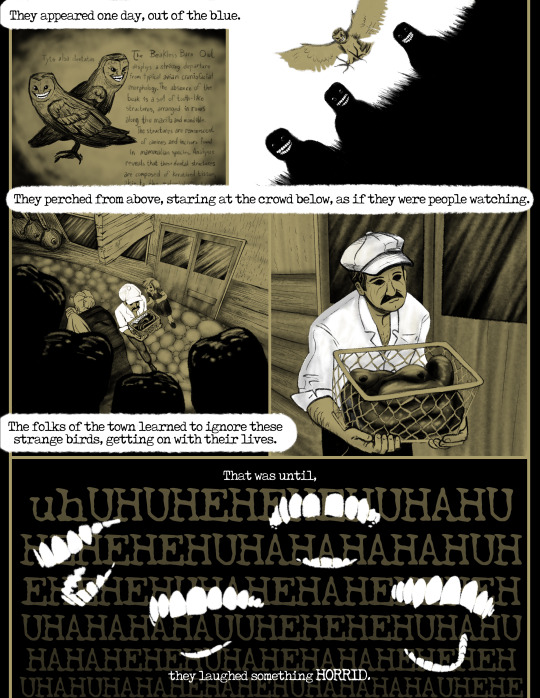
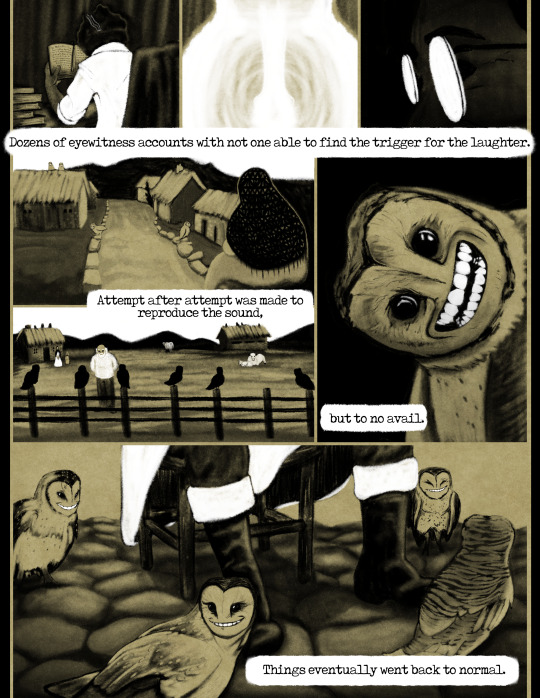
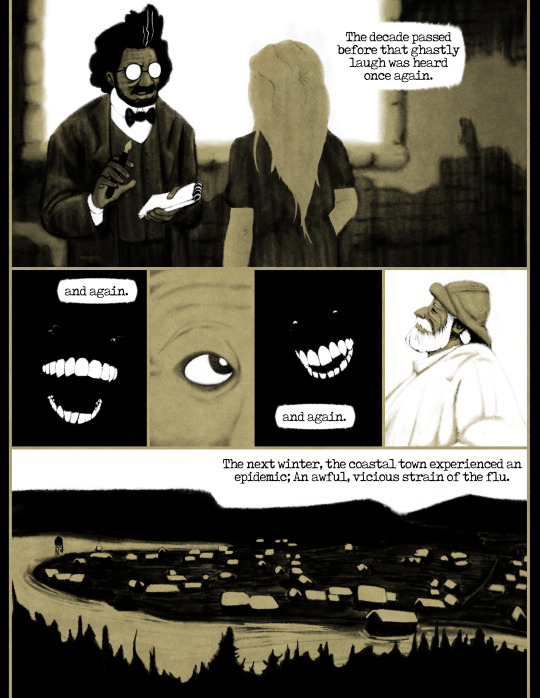
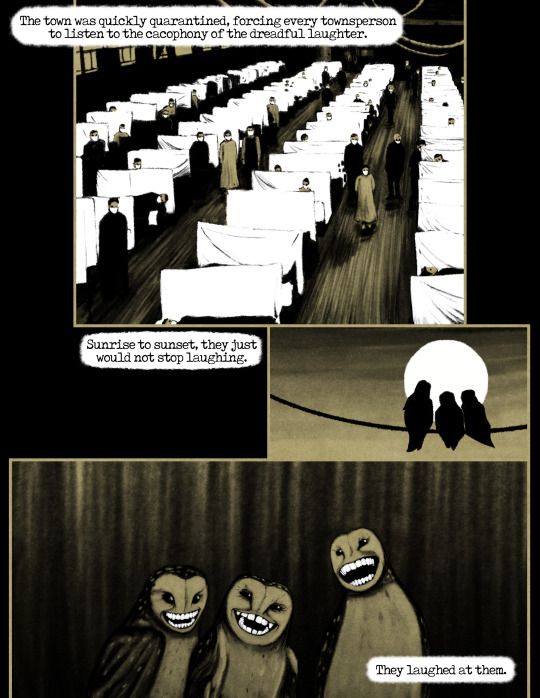
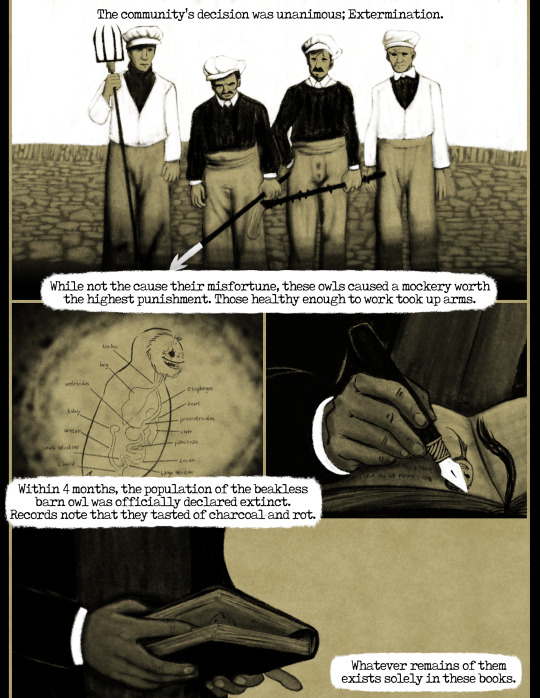
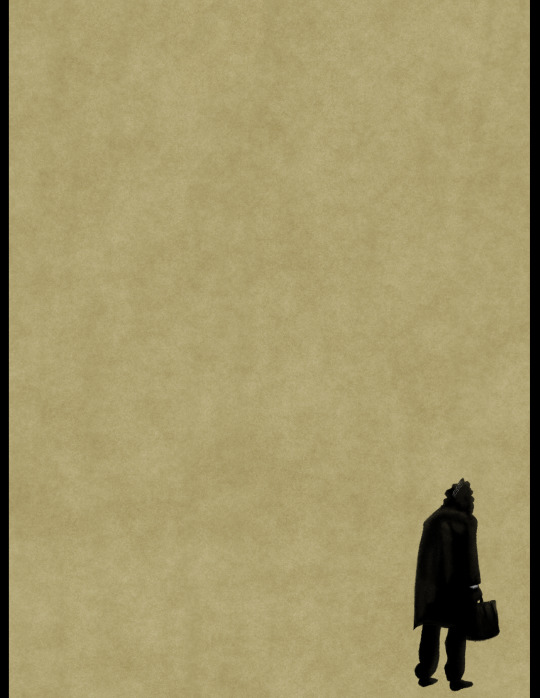
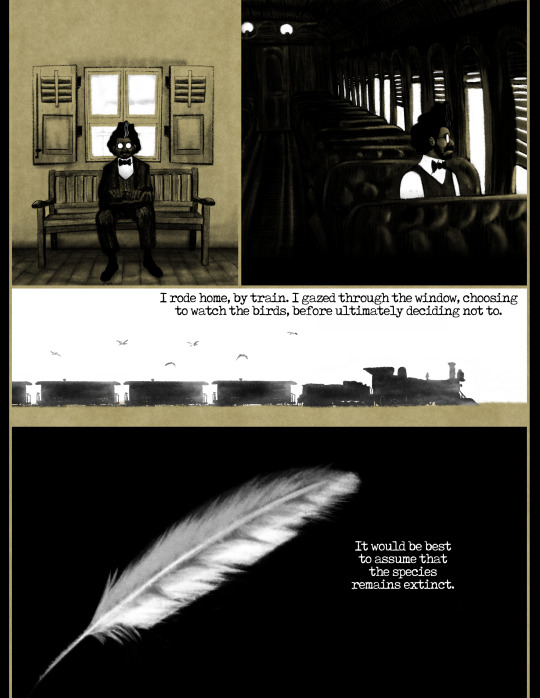
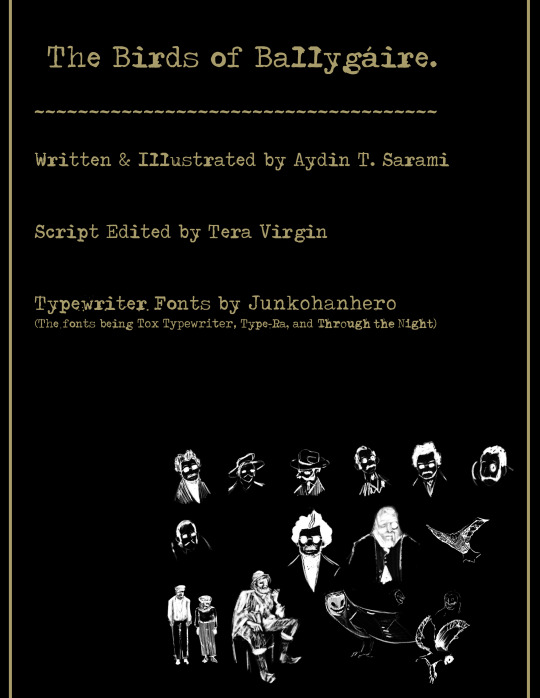
The Birds of Ballygáire.
thank you so much for reading. i appreciate it.
Special thanks to @terastrialbean for script editing & @junkohanhero for their wonderful typewriter fonts.
#oc#ocs#artists on tumblr#art#lovecraftian horror#lovecraft#horror#tyto alba#barn owl#bird#bird art#pendeedles#comic#comics#indie comic#indie comics#horror comic#teeth#irish horror#horror art#vintage#vintage horror#horror comics#indiecomics#dark fantasy#historical horror#historical fiction#illustrationartists#folk horror
790 notes
·
View notes
Text
2K notes
·
View notes
Text
All my illustrations for David Tennant's magnificent Richard II.
Act One



(No Act Two because 1) it's very short, and 2) he's a complete and utter raging git in it XD)
Act Three



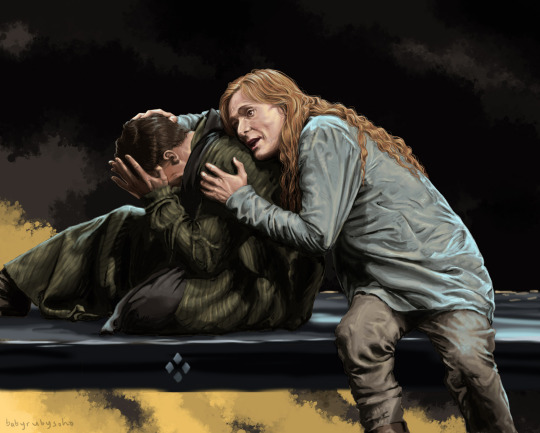


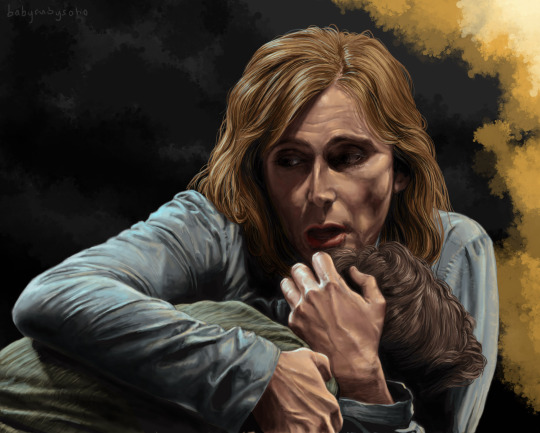
Act Four





Act Five
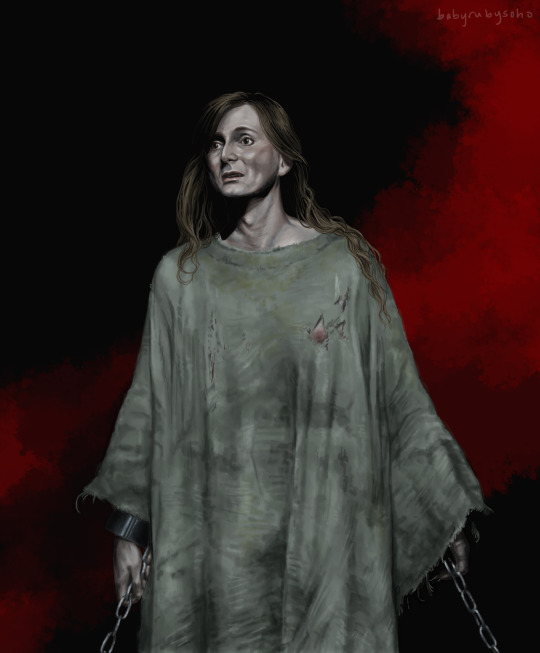

(Thought I'd throw them up all together because right now it's the art I'm proudest of😊)
#david tennant#richard ii of england#richard ii#shakespeare fanart#historical fiction#babyrubysoho art
662 notes
·
View notes
Text
"As soon as we die, we enter into fiction. Just ask two different family members to tell you about someone recently gone, and you will see what I mean. Once we can no longer speak for ourselves, we are interpreted."
— Hilary Mantel, from Reith Lectures, Resurrection: The Art and Craft
#hilary mantel#lit#literature#historical fiction#english#english lit#english literature#death#wolf hall
12K notes
·
View notes
Text
A connection between two people existed only because of their shared belief in it as real. There was no such thing as a connection with only one end. There was no such thing as love, alone.
Shelley Parker-Chan, He Who Drowned the World
#Shelley Parker Chan#He Who Drowned the World#The Radiant Emperor#quote#fiction#historical fiction#fantasy#queerlit#2023 reads
1K notes
·
View notes
Text

Divine Flesh
[prints]
#original character#oc#oc artist#southern gothic#oc artwork#digital art#trans artist#queer artist#digital painting#historical oc#historical fiction#Rosie
3K notes
·
View notes